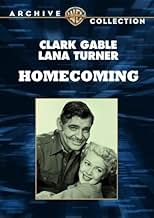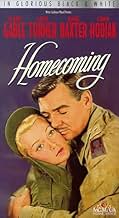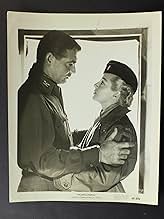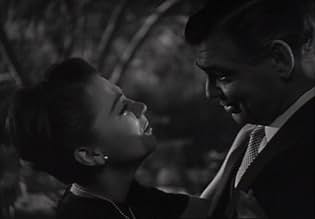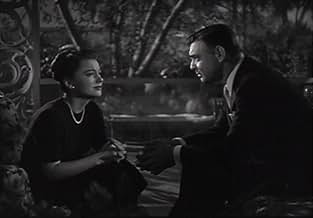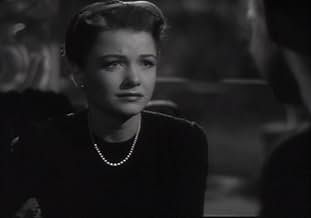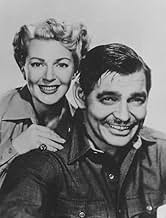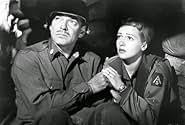IMDb RATING
6.8/10
1.2K
YOUR RATING
At the end of WW2, aboard a repatriation ship, an Army doctor reminisces about his war years while being interviewed by a reporter.At the end of WW2, aboard a repatriation ship, an Army doctor reminisces about his war years while being interviewed by a reporter.At the end of WW2, aboard a repatriation ship, an Army doctor reminisces about his war years while being interviewed by a reporter.
- Director
- Writers
- Stars
- Awards
- 4 wins total
John Albright
- Corpsman
- (uncredited)
Frank Arnold
- Maitre d'Hotel
- (uncredited)
Peggy Badley
- Nurse Betty Simpson
- (uncredited)
Art Baker
- Williams, Reporter on Transport Ship
- (uncredited)
Gregg Barton
- Captain
- (uncredited)
Nanette Bordeaux
- Nurse
- (uncredited)
- Director
- Writers
- All cast & crew
- Production, box office & more at IMDbPro
Featured reviews
Successful surgeon Ulysses Johnson (Clark Gable) joins the Army Medical Corps during WW2. Once deployed, he develops a tempestuous relationship with his chief nurse, Jane "Snapshot" McCall (Lana Turner). Their constant bickering eventually morphs into romantic feelings, which Johnson's wife Penny (Anne Baxter) can sense back home through his letters. She looks for solace from crusading doctor Robert Sunday (John Hodiak).
This somewhat soapy romance features surprisingly good performances from the cast. Gable seems an unlikely surgeon at first, but he settles into that role well. Baxter and Hodiak, a real-life married couple at the time, give their best to underwritten parts. The real revelation is Lana Turner, an actress that I've never really warmed to. I thought she fit her role well in The Postman Always Rings Twice, but every other movie that I've seen her in, I couldn't help thinking it would be better with someone else cast. Here she's real and genuine and nuanced like I haven't seen her before. It may be the script, or direction that clicked, or co-star Gable, or all of the above, but it works, and it's the best acting job I've seen from her.
This somewhat soapy romance features surprisingly good performances from the cast. Gable seems an unlikely surgeon at first, but he settles into that role well. Baxter and Hodiak, a real-life married couple at the time, give their best to underwritten parts. The real revelation is Lana Turner, an actress that I've never really warmed to. I thought she fit her role well in The Postman Always Rings Twice, but every other movie that I've seen her in, I couldn't help thinking it would be better with someone else cast. Here she's real and genuine and nuanced like I haven't seen her before. It may be the script, or direction that clicked, or co-star Gable, or all of the above, but it works, and it's the best acting job I've seen from her.
2nd viewing and a lot of time in between.
Enjoyed it first time especially how Lana pulls her role off and how sincere Gable was. Both great actors always worth watching. Anne Baxter was also very,very touching and deep as the wife.
What really got me this time, having spent war time in Nam, was the changes Gable went through and the HOMECOMING. Anyone who has NOT experienced the razor's edge of actual combat, the terror the elation and the horror of seeing others die can feel what Gable projected magnificently in coming home after all that madness and trying to feel like you fit in again anywhere. You don't....for a long time. That why Gable said "...bear with me for a while..." Not only was he talking about losing Lana but returning home from a war, sometimes much more difficult than war itself. This film has so much deep feelings embedded in all three major characters it is amazing to me. The writer nailed it and Mr LeRoy was almost genius in bringing out such performances by all. I'm glad I got to view it on TCM a 2nd time. It really brings out a HOMECOMING!!
Enjoyed it first time especially how Lana pulls her role off and how sincere Gable was. Both great actors always worth watching. Anne Baxter was also very,very touching and deep as the wife.
What really got me this time, having spent war time in Nam, was the changes Gable went through and the HOMECOMING. Anyone who has NOT experienced the razor's edge of actual combat, the terror the elation and the horror of seeing others die can feel what Gable projected magnificently in coming home after all that madness and trying to feel like you fit in again anywhere. You don't....for a long time. That why Gable said "...bear with me for a while..." Not only was he talking about losing Lana but returning home from a war, sometimes much more difficult than war itself. This film has so much deep feelings embedded in all three major characters it is amazing to me. The writer nailed it and Mr LeRoy was almost genius in bringing out such performances by all. I'm glad I got to view it on TCM a 2nd time. It really brings out a HOMECOMING!!
What a gem this story is! Here you will find no platitudes; no heroes 10 feet tall; no heels - most of all no heels. This is about the most caring, life-affirming story you are ever going to find, and it is done without any syrup, nor any gratuitous and tiresome acting-out of missteps.
There is a a single scene near the end which implies that a single misstep MAY have been committed, but sorry to tell you, you are going to have to work out for yourself what did or didn't happen, because it's not spelled out. It was brave rather than a cop-out to present a pivotal scene that way.
The film is technically excellent. The scene composition is superb. You have never seen a WW2 field hospital so meticulously and realistically re-created. There is a scene viewed through the door of a tent where someone walks away that is so amazingly technically well done (as well as evocative) as to be amazing. I can't tell you that the snow falling in that scene was real, but it LOOKED absolutely real. The fadeout as the figure walked gradually into the falling snow was perfect. It's a little thing that a film nut notices, because it's hard to do.
The messages are about finding one's humanity, daring to need, and daring to reach out to someone to need you back. By the end, you may find yourself touched so deeply as to be shaking.
There is a a single scene near the end which implies that a single misstep MAY have been committed, but sorry to tell you, you are going to have to work out for yourself what did or didn't happen, because it's not spelled out. It was brave rather than a cop-out to present a pivotal scene that way.
The film is technically excellent. The scene composition is superb. You have never seen a WW2 field hospital so meticulously and realistically re-created. There is a scene viewed through the door of a tent where someone walks away that is so amazingly technically well done (as well as evocative) as to be amazing. I can't tell you that the snow falling in that scene was real, but it LOOKED absolutely real. The fadeout as the figure walked gradually into the falling snow was perfect. It's a little thing that a film nut notices, because it's hard to do.
The messages are about finding one's humanity, daring to need, and daring to reach out to someone to need you back. By the end, you may find yourself touched so deeply as to be shaking.
Clark Gable, Lana Turner, Anne Baxter, John Hodiak, and Gladys Cooper star in "Homecoming," a 1948 film about wartime and its aftermath. Gable plays a surgeon, Lee, who falls for a nurse (Turner) with whom he puts together the wounded, endures a life with only the barest of necessities, sits in shelters, and dodges. Back home, his devoted wife (Baxter) realizes by reading his letters that she's losing him.
World War II has been romanticized often in films and in music - somehow, it is perceived by people who lived through Vietnam, Desert Storm, and our current conflicts as being somehow a cleaner war. But no war is clean, and there were some homecomings that were difficult as well. This was touched upon in "The Best Years of Our Lives," and very well here.
The story is brought to life by its players. The role of Snapshot the nurse is a different one for the glamorous and beautiful Turner than what she was normally handed - the curse of the beautiful in Hollywood. She was capable of much more, and she gives a strong performance as an outspoken soldier who finally lets her vulnerability show. The stalwart Gable gives us a man who realizes the detached attitude he had toward his patients at home will no longer work, and he has to rethink himself and his life. Baxter is the "one left out," who can't experience the war, and she gives an excellent portrayal of a woman who loves her husband but doesn't know what to expect from him when he comes home. "I know he's changed," she laments, "but why couldn't we have changed together?" Her real-life husband, John Hodiak, looks quite handsome but doesn't have much to do as a family friend - his brief brush with stardom was a few years away.
A very nice movie that shows that homecoming can be uncomfortable and bittersweet.
World War II has been romanticized often in films and in music - somehow, it is perceived by people who lived through Vietnam, Desert Storm, and our current conflicts as being somehow a cleaner war. But no war is clean, and there were some homecomings that were difficult as well. This was touched upon in "The Best Years of Our Lives," and very well here.
The story is brought to life by its players. The role of Snapshot the nurse is a different one for the glamorous and beautiful Turner than what she was normally handed - the curse of the beautiful in Hollywood. She was capable of much more, and she gives a strong performance as an outspoken soldier who finally lets her vulnerability show. The stalwart Gable gives us a man who realizes the detached attitude he had toward his patients at home will no longer work, and he has to rethink himself and his life. Baxter is the "one left out," who can't experience the war, and she gives an excellent portrayal of a woman who loves her husband but doesn't know what to expect from him when he comes home. "I know he's changed," she laments, "but why couldn't we have changed together?" Her real-life husband, John Hodiak, looks quite handsome but doesn't have much to do as a family friend - his brief brush with stardom was a few years away.
A very nice movie that shows that homecoming can be uncomfortable and bittersweet.
This is a far from perfect film featuring Gable and Turner, but upon seeing it for the second time, it sure seemed a lot better than I remembered it. In particular, I appreciated that the film took a pretty big risk dealing with wartime romance between a married doctor and a nurse when they are stationed overseas. This sort of situation MUST have happened quite a bit with all those nurses and WACS/WAVS, etc. serving in action, though it is hardly ever mentioned in any film up until that time. Plus, it offered a very unusual situation where a man is in love with a woman he is not married to and yet he still loves his wife at home. Pretty adult fare for 1948, I must say! The film begins with Gable a rich and successful doctor in the States. He is very isolated from the real world and his main focus in on the country club and his pampered wife--unconcerned about much else. When the war comes, he does serve but seems to be pretty selfish. His head nurse in the field hospital is a much more giving and selfless individual and they are destined to hate each other because they are so different AND because this IS Lana Turner and Clark Gable (this plot device is necessary before they actually fall in love--a bit of a cliché, I know).
Gable and Turner are both excellent as the leads and their scenes together are excellent as well. I especially appreciated Lana's emotional range--it was better and more vulnerable here than I am used to seeing. The direction was pretty good and all the MGM production values were going full speed ahead! I especially appreciated the snow scene--you KNOW it was done in a sound stage and yet it STILL looked exceptional (though their breath didn't show--considering it was probably close to 70 degrees).
Overall, this is a must-see for Gable fans and a pretty good flick for anyone but people who MUST have a lot of action in their films. Despite being WWII, the film is pretty talking and there is quite a bit of romance--something action junkies will probably have a hard time accepting.
Gable and Turner are both excellent as the leads and their scenes together are excellent as well. I especially appreciated Lana's emotional range--it was better and more vulnerable here than I am used to seeing. The direction was pretty good and all the MGM production values were going full speed ahead! I especially appreciated the snow scene--you KNOW it was done in a sound stage and yet it STILL looked exceptional (though their breath didn't show--considering it was probably close to 70 degrees).
Overall, this is a must-see for Gable fans and a pretty good flick for anyone but people who MUST have a lot of action in their films. Despite being WWII, the film is pretty talking and there is quite a bit of romance--something action junkies will probably have a hard time accepting.
Did you know
- TriviaAccording to the AFI catalog entry for this film, for the battle scenes in Italy, MGM constructed five 35-foot towers, a full-sized evacuation hospital, and more than 100 Army tents at the Lasky-Mesa movie ranch 35 miles outside of Hollywood. The set took three weeks to build and the scenes used hundreds of extras, five cameras, and six assistant directors. This was all for a re-creation of the historic capture of the Anzio beachhead in Italy by U.S. and British forces on January 22, 1944.
- GoofsAt the end, Penny Johnson says she followed her husband's movements on a map. During World War II, people in the military had it drilled into them that they could not say anything about where they were in letters sent back home, and to make sure they kept that rule, the mail from soldiers was censored. This has been mentioned in numerous histories of World War II. With Clark Gable being an officer, it's even less likely any information about his movements around Europe would have been available to his wife.
- ConnectionsEdited from La valse dans l'ombre (1940)
Details
- Release date
- Country of origin
- Language
- Also known as
- Renunciación
- Filming locations
- Production company
- See more company credits at IMDbPro
Box office
- Budget
- $2,654,000 (estimated)
- Runtime1 hour 53 minutes
- Color
- Aspect ratio
- 1.37 : 1
Contribute to this page
Suggest an edit or add missing content



